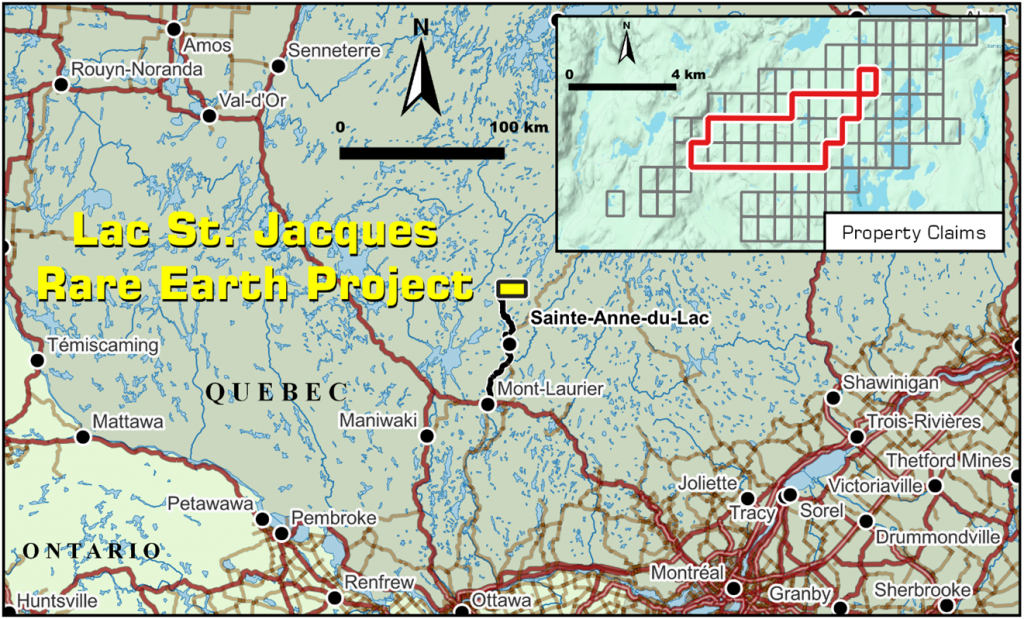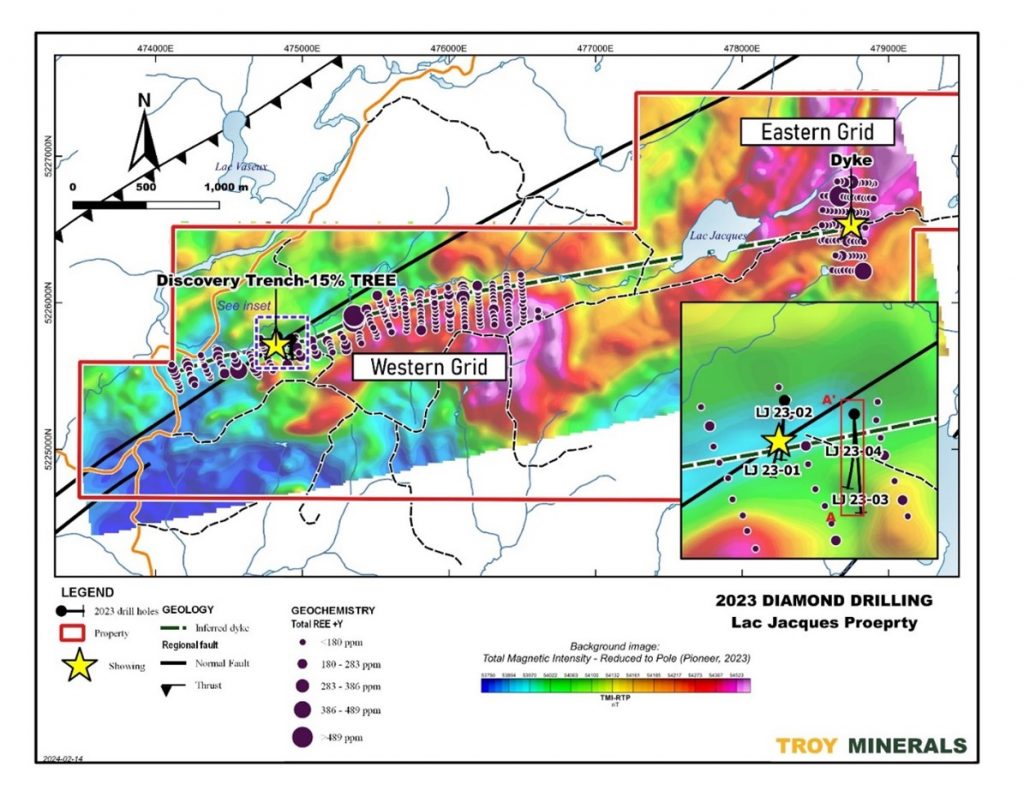
Troy Minerals (TSXV:TROY) has released results from the final two drill holes completed in Fall 2023 at its 100% owned Lac Jacques rare earth element (REE) property. The property is located approximately 250 kilometres north of Montreal, Quebec, Canada.
Rana Vig, President and CEO, commented in a press release: “The final drill holes from the 2023 program returned strongly mineralized broad intervals as well as several narrow bands of anomalous mineralization. These results further cement our confidence in the REE potential at the Lac Jacques Property. Intersecting mineralization away from structures known to control mineralization leads us to believe there are several controls and sources of REE in the area as the footprint of mineralization continues to grow. We are designing our 2024 exploration campaign for Lac Jacques and look forward to sharing those plans with our investors in the coming weeks. The company has a strong treasury position and looks to further build shareholder value through organic growth across our portfolio of prospective projects located in Tier 1 jurisdictions while continuously looking for accretive M&A opportunities.”

Drill Program Summary
The 2023 drill program at Lac Jacques consisted of four holes designed to test below and along strike of a previously identified discovery trench. Drill holes LJ-23-03 and LJ-23-04 were drilled 100 meters east of the initial holes (LJ-23-01 and -02).
Both LJ-23-03 and LJ-23-04 intersected narrow zones of anomalous rare earth mineralization (>1000 ppm TREO+Y2O) associated with pegmatitic granite and syenite in the upper sections of the holes.
- LJ-23-03: Significant intersections included 2526.1 ppm TREO over 2.90 meters, including 3627.9 ppm TREO over 0.9 meters.
- LJ-23-04: Significant intersections included 1495.9 ppm TREO over 5.40 meters, including 3274.7 ppm TREO over 1.40 meters, and 1615.3 ppm TREO over 4.40 meters, including 3107.9 ppm TREO over 1.00 meter.
Both holes also encountered a section of gabbro with minor pegmatitic syenite xenoliths. A zone of weakly anomalous TREO was associated with the syenite in both holes, suggesting a possible flat-lying mineralization zone.
Overall, the grades in these final holes were lower than those encountered in the initial holes (LJ-23-01 and -02). Additionally, the major fault zone observed in the initial holes was not intersected in the recent drilling.
Analysis of core samples from the initial holes identified various REE-bearing minerals, including allanite, fergusonite, monazite, and unidentified REE-carbonates. Allanite was found to be the primary REE-bearing mineral.
Troy Minerals plans to utilize the data collected from the drill program to identify targets for a winter 2024 drill program anticipated to commence in February or early March.
Highlights from the results are as follows:
- Hole LJ-23-03 intersected 2526.1 ppm TREO over 2.90 metres (m) from 53.0m -55.9m including 3627.9 ppm TREO over 0.9m.
- Hole LJ-23-04 intersected 1495.9 ppm TREO over 5.40m from 54.6m – 60.0m, including 3274.7 ppm TREO over 1.40m and 1615.3 ppm TREO over 4.40m from 72.6m -77.0m including 3107.9 ppm TREO over 1.00 metres.
- Drilling encountered multiple samples of anomalous REE concentrations near surface.
- Results extended the mineralization to the southeast of structures intersected in previous 2 drill holes suggesting the presence of multiple mineralizing events in the area and potentially larger mineralized footprint.
Table 1: Drill hole significant intersections, LJ-23-03, -04 (>1,000 ppm TREO+Y2O3)
| Hole | Interval (m) | Results (ppm) | |||||
| From | To | Length | TREO+Y2O | LREO | HREO | MREO | |
| LJ-23-03 | 34.0 | 35.0 | 1.0 | 1319.4 | 1240.6 | 78.4 | 247.1 |
| 45.2 | 46.0 | 0.8 | 2322.8 | 2195.2 | 126.9 | 428.8 | |
| 53.0 | 55.9 | 2.9 | 2526.7 | 2399.8 | 126.3 | 476.3 | |
| 109.5 | 110.3 | 0.8 | 1039.1 | 831.3 | 207.4 | 183.2 | |
| 114.0 | 115.7 | 1.7 | 1285.3 | 994.0 | 130.7 | 218.8 | |
| 161.0 | 164.0 | 3.0 | 1421.7 | 1298.1 | 123.2 | 272.1 | |
| LJ-23-04 | 19.6 | 20.3 | 0.7 | 1373.3 | 1298.4 | 74.6 | 251.9 |
| 21.5 | 22.5 | 1.0 | 2982.8 | 2872.2 | 109.9 | 531.1 | |
| 31.0 | 32.3 | 1.3 | 1909.1 | 1804.3 | 104.4 | 344.9 | |
| 54.6 | 60.0 | 5.4 | 1496.2 | 1404.0 | 92.1 | 278.9 | |
| 72.6 | 77.0 | 4.4 | 2440.7 | 1478.1 | 137.2 | 292.5 | |
| 219.8 | 220.0 | 0.2 | 1567.6 | 518.6 | 809.6 | 135.3 | |
Note: all intersection lengths are drill-indicated. Insufficient structural data has been obtained to estimate true widths.
LREO: Light rare earth oxides – Sum of concentration of rare earth oxides La2O3, CeO2, Pr6O11, Nd2O3, Sm2O3, Eu2O3
HREO: Heavy rare earth oxides – Sum of concentration of rare earth oxides Gd2O3, Tb4O7, Dy2O3, Ho2O3, Er2O3, Tm2O3, Yb2O3, Lu2O3, Y2O3
MREO: Magnet rare earth oxides Sum of concentration of rare earth oxides Pr6O11 and Nd2O3
TREO: Total rare earth oxides – Sum of LREO and HREO
The above references an opinion and is for information purposes only. It is not intended to be investment advice. Seek a licensed professional for investment advice. The author is not an insider or shareholder of any of the companies mentioned above.
If you would like to receive our free newsletter via email, simply enter your email address below & click subscribe.
CONNECT WITH US
Tweets
Tweet with hash tag #miningfeeds or @miningfeeds and your tweets will be displayed across this site.
MOST ACTIVE MINING STOCKS
Daily Gainers
 |
CMB.V | +900.00% |
       |
FEX.V | +50.00% |
    |
KGD.AX | +40.00% |
 Golden Minerals Company Golden Minerals Company |
AUMN | +36.01% |
       |
CRD.V | +33.33% |
       |
CASA.V | +30.00% |
       |
ADD.V | +25.00% |
       |
GDX.V | +25.00% |
    |
NAE.AX | +25.00% |
    |
CUL.AX | +25.00% |

 Follow us on Twitter
Follow us on Twitter Become our facebook fan
Become our facebook fan







